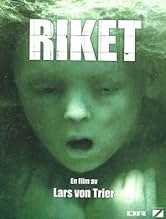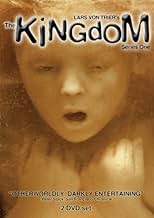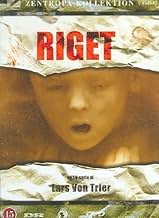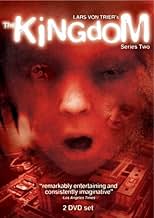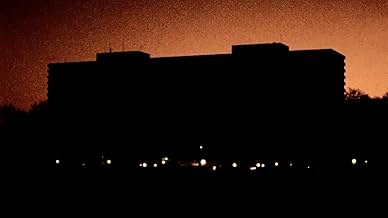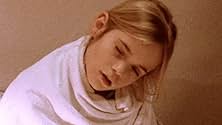Les médecins d'un hôpital ultramoderne au Danemark sont convaincus, par le biais d'événements étranges et inexplicables, que l'endroit est hanté.Les médecins d'un hôpital ultramoderne au Danemark sont convaincus, par le biais d'événements étranges et inexplicables, que l'endroit est hanté.Les médecins d'un hôpital ultramoderne au Danemark sont convaincus, par le biais d'événements étranges et inexplicables, que l'endroit est hanté.
- Récompenses
- 20 victoires et 7 nominations au total
Parcourir les épisodes
Avis à la une
I didn't like Riget I much. It was boring, and horror stories like that had been told a thousand times before. On the positive side, Stig Helmer was one of the most memorable characters ever, and he was even better than he was in the second series. Kudos to Jaregard for an outstanding interpretation. Also on the positive side, some things were funny (Helmer with the car rims) and some were genuinely absurd (where Krogshoj lives). But overall, Riget remained well inside the boundaries of the horror genre, and the narration didn't reach the critical point where everything becomes art.
Now Riget II, a masterpiece. The second series expresses all the unrealized potential of the first one. The tone is consistently grotesque, each action and interaction is quite absurd, and all the bonds with reality have been cut. There's no suspension of disbelief anymore, because everything is obviously surreal. Still, the audience is hooked till the end following a plot that is part crazy, part logical and compelling. There's much more humor and much more horror than there was in the first series, allowing the film to reach that critical point where contrast between tones and genres creates a rich canvas of relationships and meanings. You will smile at the electric car, believe the zombie poison, and listen to extremely deep pieces of philosophy by the dishwashers and Lars von Trier himself. The last scene with Little Brother is painful and hilarious at the same time, while flirting with a cosmological, universal, spiritual significance: hats off. You will also witness delightful, unbelievable situations, that make perfectly sense within the plot: this is a subtle form of art that started to reach its full potential in the nineties.
I watched Riget II before year 2000 for the first time, and then recently watched it again. At the time, I was quite shocked by its originality. Many things that von Trier did here spread around later in film making: I think this series was really ahead of the times. For example, I could not but notice the similarities between Riget II and "Arrested Development", the comedy series: camera work, editing, jumps between scenes and subplots, dry humor, over the top characters, lots of things were exactly the same. It's like Von Trier developed a language to imagine and handle absurd situations with ease; you can notice the obvious progress he made from Riget I to II.
Now Riget II, a masterpiece. The second series expresses all the unrealized potential of the first one. The tone is consistently grotesque, each action and interaction is quite absurd, and all the bonds with reality have been cut. There's no suspension of disbelief anymore, because everything is obviously surreal. Still, the audience is hooked till the end following a plot that is part crazy, part logical and compelling. There's much more humor and much more horror than there was in the first series, allowing the film to reach that critical point where contrast between tones and genres creates a rich canvas of relationships and meanings. You will smile at the electric car, believe the zombie poison, and listen to extremely deep pieces of philosophy by the dishwashers and Lars von Trier himself. The last scene with Little Brother is painful and hilarious at the same time, while flirting with a cosmological, universal, spiritual significance: hats off. You will also witness delightful, unbelievable situations, that make perfectly sense within the plot: this is a subtle form of art that started to reach its full potential in the nineties.
I watched Riget II before year 2000 for the first time, and then recently watched it again. At the time, I was quite shocked by its originality. Many things that von Trier did here spread around later in film making: I think this series was really ahead of the times. For example, I could not but notice the similarities between Riget II and "Arrested Development", the comedy series: camera work, editing, jumps between scenes and subplots, dry humor, over the top characters, lots of things were exactly the same. It's like Von Trier developed a language to imagine and handle absurd situations with ease; you can notice the obvious progress he made from Riget I to II.
Few films have had me in their grip as von Trier's THE KINGDOM. Difficult to describe in words. Basically a horror epic that takes you to a hospital that no self-respecting human would set foot in. The camerawork is a real feat of genius. Why? Well, for such jerky movement to hold my attention for 4 AND ONE HALF HOURS I have nothing but admiration.
And it made me want to see Part II immediately after! Come to think of it, if Lars wanted to, he could have made it a week long marathon and I would have forgone sleep to see it's conclusion! Bring me buckets of espresso and bags of sugar! I ain't goin' anywhere.........
And it made me want to see Part II immediately after! Come to think of it, if Lars wanted to, he could have made it a week long marathon and I would have forgone sleep to see it's conclusion! Bring me buckets of espresso and bags of sugar! I ain't goin' anywhere.........
Simply one of the best and most original European tv series ever. So original, clever and visually groundbreaking it was way ahead of its time. Dont miss this one!
10AdFin
Acclaimed director Lars Von Trier came to Riget (The Kingdom) after the failure of his film Europa (1991) and some trouble with his personal life, weather these contrasting elements had anything to do with the set up of the story of the Kingdom is unknown, but it might explain the playfulness of the film. This was the first time that von Trier would use the documentary-style approach he continued in his Dogme film The Idiots (1998) and with this project it worked wonders at enriching the source material with a certain satire. We except straight away that these bizarre occurrences are actually happening in the largest hospital in Denmark (The Kingdom of the title) and we have no reason to doubt it. As well as visual style, the characterisation is also good, Von Trier and fellow writers Tomas Gíslason and Niels Vørsel understand that we need to be interested in the characters of a TV show if we are to follow them for the duration of the series, and the characters in The Kingdom are no exception. We have at the focus of the action Dr Helmer played by the late Ernst-Hugo Järegård, a Swede with a troubled past who despises the hospital and it's practices, his recurring catchphrase "Bloody Danes" is a memorable addition to the proceedings. But more importantly is the character of Mrs Drusse (Kirsten Rolffes), the Ms Marple type character who's strange visions of the ghostly young Mary set the ball rolling. All of the actors are perfectly cast and have a great time mixing the surreal horror with the more comedic moments. Having seen both series of the Kingdom, I would say that series two is much better, perhaps because by this time we have a better grasp on the characters, but that by no way means that series one isn't just as good, let's not forget just how important a stepping stone it is. With this one Von Trier and co-director Morten Arnfred created a modern TV masterpiece. 10/10
I have a weak spot for Danish cinema and TV. I think that their filmmaking is anchored to reality. Even if "Riget'' is a show about the supernatural, the narration and some of the events told feels likely to happen. No crazy monster or unjustified and over the top violence. Lars Von Trier managed to keep my interest for all the episodes, while he slowly unveils the mystery. It is a balanced series with peculiar characters having parodistic traits. I believe that this is why this show works well: there are scary elements, but it does not take itself too seriously. The show is entirely set in a hospital and it is the perfect location for this story, with all its long corridors and creepy basements. The acting is good and it looks natural, nothing feels forced and I enjoyed the Ernst-Hugo Järegård performance. Out of all the characters, I think that Stig was the most interesting one. I also enjoyed Søren Pilmark: Hook is the proper anti hero of this story. I liked how he handles certain tough situations with biting sarcasm. Sigrid Drusse together with Bulder are the perfect ghost hunters couple, that will enable the entire supernatural storyline. At the beginning this is marginal, but then it will gradually become central towards the end of the first season and it will then be enriched during the second one. In 2022, after more than 20 years, we finally have a closure to this story. "Exodus" feels at times more like a reboot rather than a proper continuation. To be honest I was not very convinced by the pilot, it looked very strange and illogical, but then things get better in the mid-season. I think that the director did the best he could with what he had, considering that most of the main cast is dead. However, Von Trier managed to call back quite a few original members, and this was a good gift to all the fans of the show. I was very happy to see Willem Defoe taking part in this project. "Riget" is truly a different ghost story with an original plot. Compared to his other jobs, it is not as graphic, so potentially there is room for a larger audience pool. My final score is 8 stars out of 10.
Le saviez-vous
- AnecdotesFor the German-speaking markets, 'Riget' was translated into 'Hospital der Geister - The Kingdom', as a direct translation, 'Das Reich', for obvious reasons was deemed inappropriate.
- GaffesHelmer procures hot coffee, and enters the archive. Mogge returns, with Krogshøj, and they lock Helmer in - he's left standing with a cup of scalding coffee - he can't move with setting off the infra-red alarm sensors. He's left, statue-like, staring at his cup of steaming liquid. Cut to Drusse and Bulder. She says she has to perform a seance for some doctors, and tells Bulder that in 1 hour, they are to attempt to enter the archive. When they get there, they inadvertently liberate Helmer, who casts away his cup of still scalding, yet hour-old coffee.
- Versions alternativesOriginally shown as a TV miniseries in 4 episodes. A slightly longer theatrical version was released abroad after the TV premiere.
- ConnexionsFeatured in I Lars von Triers rige - en mand og hans tv-serie (1994)
Meilleurs choix
Connectez-vous pour évaluer et suivre la liste de favoris afin de recevoir des recommandations personnalisées
- How many seasons does The Kingdom have?Alimenté par Alexa
Détails
- Date de sortie
- Pays d’origine
- Langues
- Aussi connu sous le nom de
- The Kingdom
- Lieux de tournage
- Sociétés de production
- Voir plus de crédits d'entreprise sur IMDbPro
Contribuer à cette page
Suggérer une modification ou ajouter du contenu manquant




